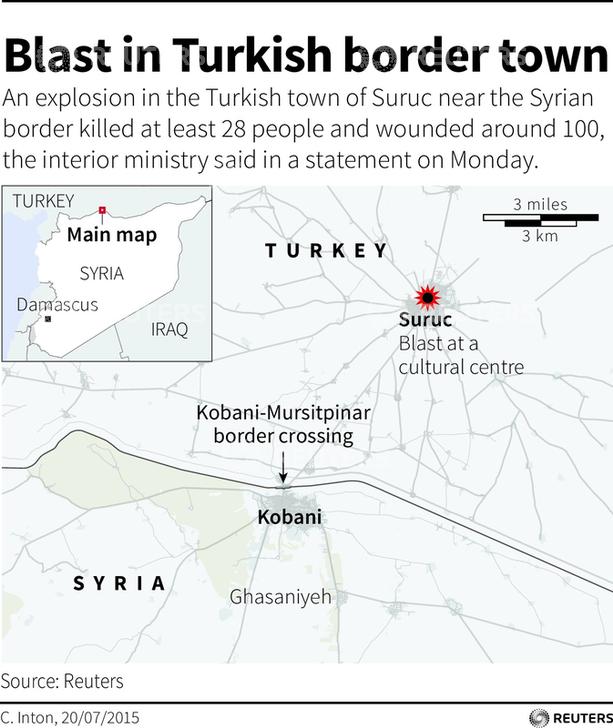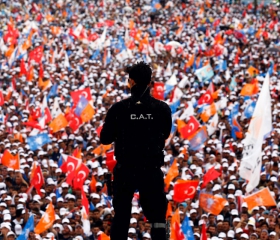On July 20, 2015 the Turkish city of Suruc on the border with Syria fell victim to an horrific terrorist attack that took the lives of more than 30 people and injured another 100 — young activists of the left-wing Federation of Socialist Youth Associations (Sosyalist Gençlik Derneği Federasyonu – SGDF) who had travelled across the entire country to take part in a campaign to restore the neighbouring Syrian city of Kobane. The terrorist attack quite literally shook Turkey to its core. Demonstrations were held all over the country, with the people demanding that those responsible be brought to justice and accusations flying that the government had gone too far in its toying with ISIS militants.
On July 20, 2015 the Turkish city of Suruc on the border with Syria fell victim to an horrific terrorist attack that took the lives of more than 30 people and injured another 100 — young activists of the left-wing Federation of Socialist Youth Associations (Sosyalist Gençlik Derneği Federasyonu – SGDF) who had travelled across the entire country to take part in a campaign to restore the neighbouring Syrian city of Kobane. Fighting between ISIS and Kurdish people’s protection units had raged in the city for almost six months. The explosion occurred when the protesters — around 300 people — gathered for a news conference in the Amara Culture Centre to explain to the media the idea behind the campaign to restore the city.
The terrorist attack quite literally shook Turkey to its core. Demonstrations were held all over the country, with the people demanding that those responsible be brought to justice and accusations flying that the government had gone too far in its toying with ISIS militants. In Istanbul, a large-scale protest calling for the resignation of the government escalated into violent confrontations with police. The political climate in the country, where a coalition cabinet still has not been formed following the June 7 parliamentary elections, is through the roof. And every event of significance becomes a field of confrontation and bargaining among the political sides. The tragedy in Suruc was no exception.
Prime Minister Ahmet Davutoglu made a special appeal calling for all opposition parties to prepare a joint declaration condemning the terrorist attacks and setting out ways to fight ISIS. A striking feature of this statement was that it did not include the now-standard Turkish criticism of the Syrian regime as an instigator of destabilization in the region. The Turkish government accused the Bashar al-Assad regime of being behind the May 2013 car bombings in Reyhanli, which killed 50 people, for example. Similar accusations were made against Damascus again in March 2011, after the terrorist act in Nigde.
Meanwhile, the opposition parties are quite rightly pointing their fingers at the inaction of government and the ineffectiveness of its security forces. The main suspect in another recent terrorist attack — the explosion in Diyarbakir during a Peoples’ Democratic Party (HDP) rally on June 5, 2015, which killed four and injuring another 100 — was on the authorities’ radar for a long time, and even under surveillance, before the matter was suddenly dropped. The opposition has many similar questions. The vice-chairman of the Republican People’s Party (CHP) — the main opposition party in Turkey — Veli Agbaba stated that the “tragedy is the result of the government’s policy with regard to the Syria issue, as well as the activity of the special services.” These sentiments were echoed by the leader of the HDP, Selahattin Demirtas, who noted that “nobody in the Kurdish provinces on the border with Syria could have taken a single step without the security services knowing about it.” This is why the government is one hundred per cent responsible for the tragedy. Leader of the ultra-right Nationalist Movement Party Devlet Bahceli (MHP), on the contrary, questioned the true motives of the campaign that brought young leftists to Suruc, falling just short of blaming the activists themselves for the attack, as their goals were “dubious”. Bahceli’s reaction clearly fits into the traditional nationalist rhetoric, which has stood in firm and irreconcilable opposition to the left since the 1960s.
At the same time, the explosions in Suruc came after the Turkish police had rolled out operations to neutralize ISIS supporters in the country, an act that was seen by the public as an attempt to erase suspicions that the Turkish government had been working with the terrorist organization. The tragedy in Suruc is thus being presented as a reaction on the part of ISIS to the large-scale anti-terror operation that has started in the country. Prime Minister Ahmet Davutoglu’s response to a journalist’s question at a press briefing about the link between the special forces operation carried out two weeks previously that saw 27 people detained in four provinces (including six ISIS terrorists) and the attack on the Amara Culture Centre in Suruc was revealing: “Tell it to those who are accusing the government of aiding the terrorists. Turkey has always been at the forefront of the fight against ISIS and similar terrorist organizations.”
However, information published in the Turkish press suggested that the special services had been aware that groups of ISIS militants had penetrated the Turkish borders with the intent of committing terrorist attacks long before July 10. According to the Turkish papers, police in the city of Kilis on the Syrian border received a tip off in early June that eight suicide bombers had been sent to Turkey from Al-Raqqah in Syria. What is more, police reports indicate that two of the shahids had entered Turkey at the beginning of June, while the remaining six were to arrive in mid-July.
The political opposition poses a reasonable question: if the authorities had knowledge of the impending terrorist attacks, then why were the necessary security measures not taken? And why were the ISIS militants that managed to cross the border not neutralized? Another reason why the anti-terrorist operation on July 10 was not taken seriously is the fact that, out of the 27 people detained as part of the operation, 20 were soon released, and only one of the six ISIS militants was arrested. The vulnerability of the argument that the terrorist attack in Suruc occurred as a reaction to Turkey stepping up its fight against ISIS lies in the fact that in spring 2014, when there was not even a whisper about anti-ISIS operations, a number of similarly devastating attacks were carried out by extremists on Turkish soil.
Now, at a time of political tensions, and with the threat of early parliamentary elections looming — the 45-day time period allowed for by the Constitution will soon expire — it would seem that the current government is genuinely going to intensify its anti-terror campaign, thus yielding to pressure from the West (the recent visit of Special Presidential Envoy John R. Allen to persuade Ankara to step up joint efforts to fight ISIS comes to mind), as well as to the obvious demand among Turkish citizens for concrete steps to be taken against ISIS. And we can expect that stepping up special operations in this regard will be accompanied by a “tightening of the screws” in other areas, which will further complicate the already difficult situation with the freedom of speech and civil rights in Turkey. In the extreme conditions of the anti-terror campaign, the people of Turkey will look differently upon the prospect of a military operation on Syrian soil.






